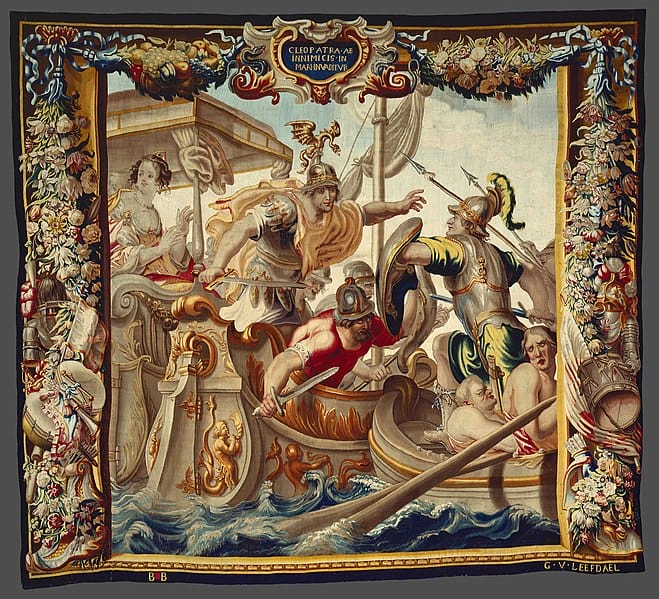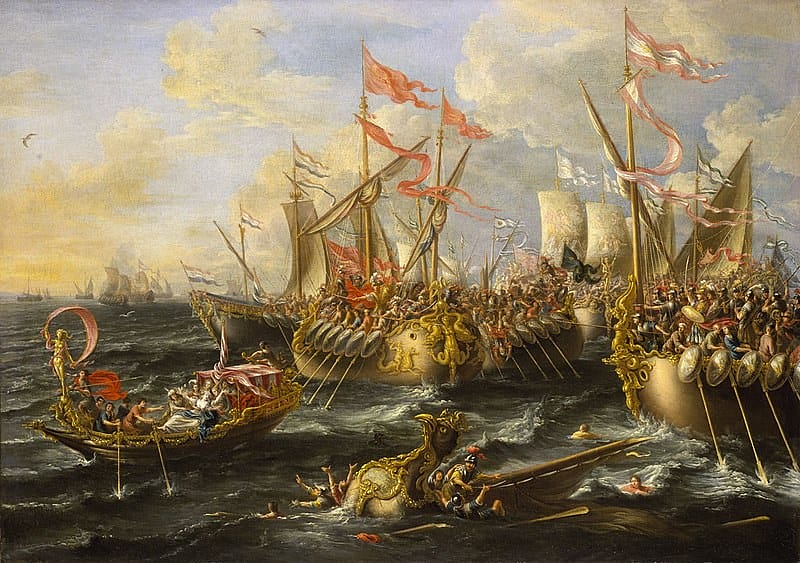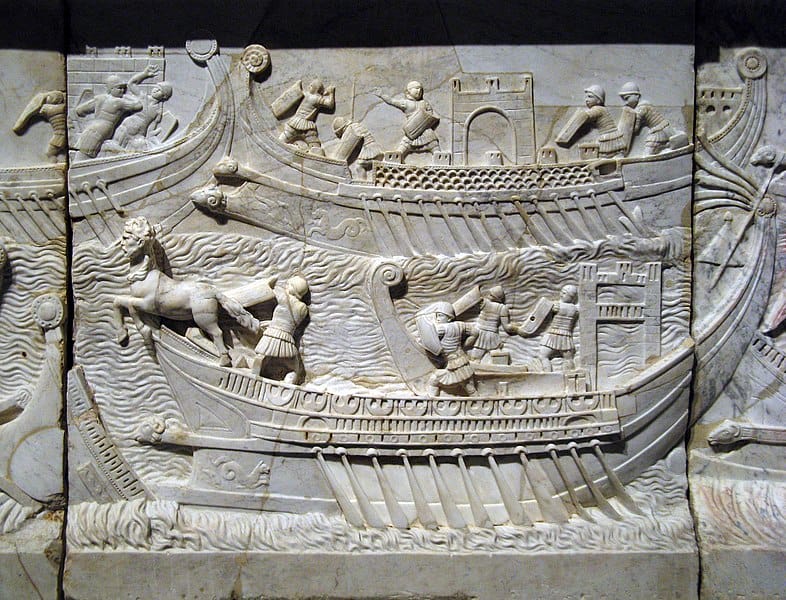The Battle of Actium was a naval battle that took place on September 2, 31 BC, off the western coast of Greece. It was fought between the forces of Octavian, later known as Augustus Caesar, and the combined forces of Mark Antony and Cleopatra. The battle is considered one of the most significant naval engagements in history and marked the end of the Roman Republic and the beginning of the Roman Empire.

Historical Context
The Battle of Actium was the culmination of a long-standing power struggle between Octavian and Mark Antony. After the assassination of Julius Caesar in 44 BC, Mark Antony, along with Caesar’s great-nephew Octavian and Lepidus, formed the Second Triumvirate to rule Rome. However, the alliance between Antony and Octavian soon broke down, and a civil war ensued. The Battle of Actium was the final battle of this conflict, with Octavian emerging as the victor.
The Battle of Actium was fought between two powerful alliances. On one side were the forces of Octavian, consisting of Roman legions and a fleet of ships. On the other side were the combined forces of Mark Antony and Cleopatra, including Egyptian, Syrian, and Greek troops, as well as a large fleet of ships. The two sides clashed in a naval battle that lasted for several hours and resulted in a decisive victory for Octavian.
Key Takeaways
- The Battle of Actium marked the end of the Roman Republic and the beginning of the Roman Empire.
- The battle was the culmination of a long-standing power struggle between Octavian and Mark Antony.
- The battle was fought between the forces of Octavian and the combined forces of Mark Antony and Cleopatra.
Lead-Up to the Battle
The Battle of Actium was fought in 31 BC between the forces of Octavian and those of Mark Antony and Cleopatra. The battle was the culmination of a long-standing rivalry between Octavian and Antony, which had been brewing for years. The two men had once been allies, but their relationship had soured over time, with Octavian accusing Antony of various misdeeds, including adultery and treason.
In the years leading up to the battle, tensions between the two men continued to escalate. Antony had aligned himself with Cleopatra, the queen of Egypt, and the two had become lovers. This relationship further angered Octavian, who saw it as a threat to his own power and influence.
Political Background
The Battle of Actium was also a significant event in the political history of Rome. At the time, Rome was in a state of transition, with the Roman Republic giving way to the Roman Empire. Octavian, who would later become the first Roman emperor, was one of the key figures in this transition.
Antony, on the other hand, represented the old guard of Roman politics. He was a member of the Second Triumvirate, a political alliance that had been formed in the aftermath of Julius Caesar’s assassination. The Triumvirate was supposed to be a temporary arrangement, but it had continued for years, with Antony, Octavian, and Lepidus sharing power.
Tensions between the members of the Triumvirate had been growing for some time, and the Battle of Actium marked the end of the alliance. Octavian emerged as the clear victor, and he would go on to become the sole ruler of Rome.

Octavian’s Forces
Octavian fleet was composed of approximately 400 warships, including quinqueremes, triremes, and smaller vessels. Octavian’s forces were well-trained and disciplined, and he had the support of many experienced commanders, including Agrippa, who served as his admiral.
Mark Antony’s Forces
Mark Antony’s fleet consisted of approximately 500 warships, including quinqueremes, triremes, and smaller vessels. Antony’s forces were composed of a mix of Roman and Egyptian troops, and many of his soldiers were veterans of the Roman legions.
The Role of Cleopatra
Cleopatra, the queen of Egypt, played a significant role in the Battle of Actium. She commanded a portion of Antony’s fleet and was responsible for supplying his forces with troops and resources. Cleopatra was also a skilled politician and diplomat, and she played a key role in securing the support of many of Antony’s allies in the East.
Overall, the Battle of Actium was a clash between two powerful factions in the Roman world: Octavian’s forces, representing the interests of Rome and the West, and Antony’s forces, representing the interests of Egypt and the East. The battle marked a turning point in Roman history and paved the way for the establishment of the Roman Empire under Augustus.
The Battle
The battle began with the fleets facing each other, with the wind blowing from the south. Antony’s ships tried to outflank Octavian’s fleet, but the Roman ships were able to maintain their formation, thanks to the Corvus, which allowed them to board and capture several enemy ships. Antony’s ships then tried to ram into Octavian’s ships, but the Roman fleet was able to evade most of the attacks by maneuvering quickly.

Source: Unknown artistUnknown artist, Public domain, via Wikimedia Commons
The turning point of the battle came when Cleopatra, who was commanding the Egyptian ships, decided to withdraw from the battle. Antony, who was in love with Cleopatra, followed her with his ships, leaving his fleet vulnerable to attack. Octavian’s ships quickly took advantage of this and started attacking Antony’s ships from all sides. Antony’s fleet was quickly destroyed, and he was forced to flee with Cleopatra.
The naval battle of Actium was a significant turning point in Roman history, as it marked the end of the Roman Republic and the beginning of the Roman Empire. Octavian’s victory over Mark Antony and Cleopatra ensured his position as the sole ruler of Rome and paved the way for the Pax Romana, a period of relative peace and stability that lasted for centuries.
Aftermath
The Battle of Actium was a decisive victory for Octavian and marked the end of the Roman Republic. The immediate aftermath of the battle saw the disintegration of Antony’s forces and his eventual suicide. Cleopatra also committed suicide shortly thereafter, bringing an end to the Ptolemaic dynasty in Egypt.
In the aftermath of the battle, Octavian emerged as the undisputed ruler of Rome. He was granted the name Augustus by the Roman Senate and became the first Roman Emperor. Augustus went on to establish a new era of peace and prosperity known as the Pax Romana, which lasted for over two centuries.
The Battle of Actium was a turning point in Roman history, as it marked the beginning of Octavian’s ascendancy to power. Following his victory, Octavian consolidated his power by eliminating his political rivals and establishing a new system of government. Under Augustus’ rule, the Roman Empire underwent a period of significant expansion and development. Augustus reformed the Roman legal system, established a standing army, and embarked on a massive building program that transformed Rome into a magnificent city.
Fall of the Republic
The Battle of Actium marked the end of the Roman Republic, which had been in decline for several decades. The Republic had been weakened by political instability, corruption, and economic decline.
Following the battle, Augustus established a new form of government known as the Principate, which was characterized by a strong central authority and a system of checks and balances. The fall of the Republic marked the beginning of a new era in Roman history, one that would see the rise of the Roman Empire and the establishment of a new world order.
Cultural Impact
The Battle of Actium had a significant impact on literature and art. The Roman poet Virgil’s famous epic poem, the Aeneid, features a description of the battle and its aftermath. The poem portrays the Roman victory as a triumph of order over chaos and serves as a celebration of Augustus’ reign. The battle also inspired numerous works of art, including paintings, sculptures, and mosaics. One of the most famous depictions of the battle is a large marble relief on the walls of the Maison Carrée in Nîmes, France.

The Battle of Actium had a profound impact on public perception. Augustus’ victory over Antony and Cleopatra solidified his position as the sole ruler of Rome and marked the end of the Roman Republic. The battle also marked a significant shift in the balance of power in the Mediterranean world, with Rome emerging as the dominant power. The victory was celebrated throughout the Roman Empire and served as a symbol of Roman strength and unity.
Archaeological Findings
Archaeological findings at the site of the Battle of Actium have provided valuable insight into the events that took place in 31 BC. One of the most significant discoveries was the identification of several shipwrecks in the waters off the coast of Actium. These wrecks were found to contain a variety of artifacts, including weapons, coins, and pottery. The weapons found in the wreckage included swords, spears, and javelins. Many of these weapons were heavily corroded, indicating that they had been in the water for a long period of time. The coins found at the site were primarily Roman denarii, which were used as currency during the time of the battle.
In addition to weapons and coins, archaeologists also found a large amount of pottery at the site. This pottery was used for a variety of purposes, including storing food and water and cooking. Some of the pottery was decorated with intricate designs, indicating that it was likely used by wealthy individuals.
The discovery of these artifacts has allowed researchers to gain a better understanding of the equipment and resources available to the soldiers who fought in the Battle of Actium. It has also shed light on the daily lives of the people who lived in the area during this time period.
The archaeological findings at the site of the Battle of Actium have provided valuable information about this historic event. The discovery of shipwrecks and artifacts has allowed researchers to piece together a more complete picture of what happened during the battle and has provided insight into the lives of the people who lived in the area during this time period.
Modern Interpretations
The Battle of Actium has been a subject of historical interest and research for centuries. Historians have analyzed the event from various perspectives, including political, military, and cultural. Some historians have focused on the role of Antony and Cleopatra in the battle, while others have emphasized the significance of Octavian’s victory in shaping the political landscape of the Roman Empire.
In recent years, there has been a growing interest in the social and cultural aspects of the Battle of Actium. Scholars have explored the impact of the battle on the people of Egypt and Rome, as well as the broader cultural and artistic trends of the time. This has led to a more nuanced understanding of the battle as a complex historical event with far-reaching consequences.
In Popular Culture
The Battle of Actium has also had a significant impact on popular culture. It has been the subject of numerous works of literature, art, and film and has inspired countless interpretations and adaptations. Some of the most notable examples include Shakespeare’s Antony and Cleopatra, Handel’s opera Giulio Cesare, and the 1963 film Cleopatra.
In recent years, there has been a renewed interest in the Battle of Actium among popular audiences. This has been driven in part by the success of historical dramas such as Game of Thrones and Vikings, which have helped to popularize the genre. As a result, there has been a growing demand for accurate and engaging depictions of historical events such as the Battle of Actium. The Battle of Actium remains a fascinating and important event in world history. Its impact on the Roman Empire and the wider world cannot be overstated, and its legacy continues to be felt to this day.
People Also Ask:
Who emerged victorious in the Battle of Actium?
The Battle of Actium was won by Octavian, who later became known as Augustus, the first Roman Emperor. His victory over the combined forces of Mark Antony and Cleopatra marked the end of the Roman Republic and the beginning of the Roman Empire.
What were the main reasons for Antony’s defeat at the Battle of Actium?
Antony’s defeat can be attributed to several factors, including his poor leadership, lack of naval experience, and the defection of some of his key allies. Additionally, his decision to engage in battle on unfavorable terms and his reliance on Cleopatra’s support proved to be fatal mistakes.
What were the consequences for Rome following the Battle of Actium?
The Battle of Actium had far-reaching consequences for Rome. It resulted in the establishment of the Roman Empire, with Augustus as its first emperor. It also marked the end of the Roman Republic, which had been in decline for several decades. The battle also solidified Rome’s control over the Mediterranean world and paved the way for centuries of Roman dominance.
What was the duration of the Battle of Actium?
The Battle of Actium took place on September 2, 31 BC, and lasted for several hours. The exact duration of the battle is not known, but it is estimated to have lasted between four and six hours.
How significant was the Battle of Actium in the context of Roman history?
The Battle of Actium was a pivotal moment in Roman history. It marked the end of the Roman Republic and the beginning of the Roman Empire. It also solidified Rome’s control over the Mediterranean world and paved the way for centuries of Roman dominance. The battle is widely regarded as one of the most significant events in ancient history.
What was the estimated number of casualties in the Battle of Actium?
The exact number of casualties in the Battle of Actium is not known. However, it is estimated that several thousand soldiers were killed or wounded on both sides. The battle was particularly brutal, with many soldiers drowning or being burned alive when their ships caught fire.
Hello, my name is Vladimir, and I am a part of the Roman-empire writing team.
I am a historian, and history is an integral part of my life.
To be honest, while I was in school, I didn’t like history so how did I end up studying it? Well, for that, I have to thank history-based strategy PC games. Thank you so much, Europa Universalis IV, and thank you, Medieval Total War.
Since games made me fall in love with history, I completed bachelor studies at Filozofski Fakultet Niš, a part of the University of Niš. My bachelor’s thesis was about Julis Caesar. Soon, I completed my master’s studies at the same university.
For years now, I have been working as a teacher in a local elementary school, but my passion for writing isn’t fulfilled, so I decided to pursue that ambition online. There were a few gigs, but most of them were not history-related.
Then I stumbled upon roman-empire.com, and now I am a part of something bigger. No, I am not a part of the ancient Roman Empire but of a creative writing team where I have the freedom to write about whatever I want. Yes, even about Star Wars. Stay tuned for that.
Anyway, I am better at writing about Rome than writing about me. But if you would like to contact me for any reason, you can do it at contact@roman-empire.net. Except for negative reviews, of course. 😀
Kind regards,
Vladimir
